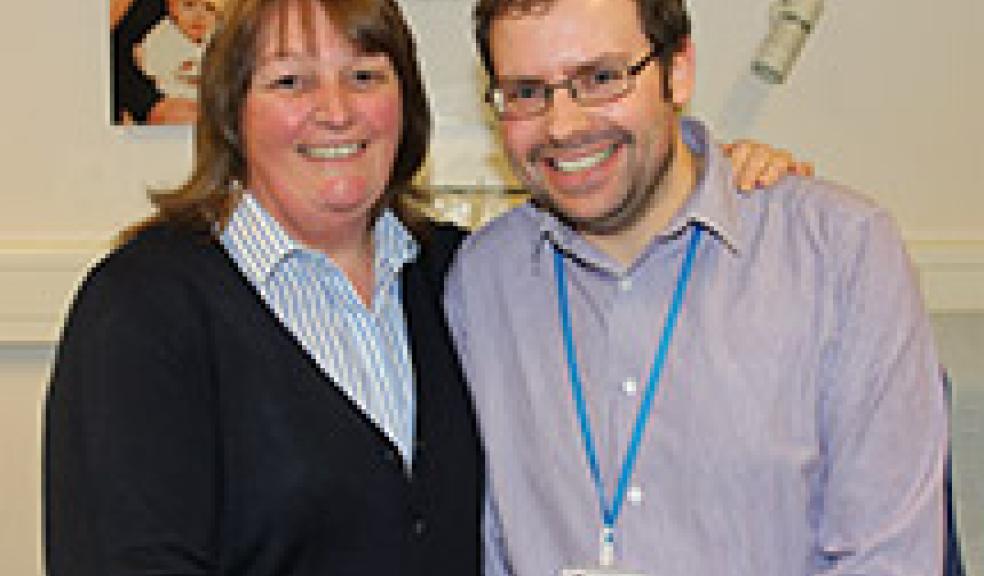
Di’s 50th blood donation is extra special
A member of staff at Derriford Hospital recently donated her 50th pint of blood and one of the reasons for this donation was especially close to her heart.
Di Brimacombe, Senior Project Support Manager at Derriford Hospital, has now been donating blood for over 30 years. In 2014, a colleague and close friend of Di’s, Jamie Lynde, was diagnosed with leukaemia, pushing her to promote blood donation more than ever.
Di said: “I first donated blood in the 1984 and back then I had no idea of the importance of what I was actually doing, naively I just thought it was a nice thing to do! Over 30 years later and on the anniversary of my 50th donation, I have a much better understanding as to why it is so important to give blood and furthermore continue to do so.
“For me, the importance to give blood is heightened due to the fact that my blood group is O Rhesus Negative. Having O negative blood means that regardless of a recipient’s blood type, any recipient can receive it. My blood group is therefore used in the event of emergency accidents and given to new born babies where necessary; where there has not been enough time to establish an individual blood type.
“Research shows that 25% of us will one day need blood; you never know, one day you may add to this statistic. Only last year my dear colleague Jamie Lynde was diagnosed with leukaemia; Jamie was one of the luckier ones and did not need a transfusion and is now thankfully in full remission. But like all of us, it is expected that the blood will be available for us should we need it, this is only possible with continued donations.
“It takes approximately 30 minutes of my day, two or three times a year to donate, but ultimately could save many lives.”
Jamie Lynde, Site Services Support Manager at Derriford Hospital, regularly gave blood at the Derriford Blood Donation Centre, but is now unable to do this after being diagnosed with leukaemia. His experience has since opened his eyes at the value of blood and blood products and how they are used.
Jamie said: “After six months following my diagnosis and commencement of my treatment, the doctors told me that I was in complete molecular remission. This is a testament to the dedicated research and trials that go into fighting diseases like this.
“I know that a lot of people who are diagnosed with my condition won't have as much of a straightforward journey as I have had so far. Some people with leukaemia may require blood transfusions to boost their blood cell count if they become anaemic and others may require platelets if their bone marrow is not working correctly and their platelet levels become too low.
“Some people may say that giving blood can be a little uncomfortable or a bit of a hassle when we are all so busy with our own lives. On the other hand, I would imagine that having to be the one receiving blood products is more of a hassle. I'm lucky enough not to have needed this during my treatment, but I spent many hours waiting for appointments and tests with people who did.
“Blood products can do so much to help with a wide range of conditions and problems, not just leukaemia. It's such a simple way to change someone's life.”
Karen Healy, Senior Marketing Coordinator at NHS Blood and Transplant said: “The beginning of the year is a great time to make changes to your lifestyle and is the perfect time to give blood.
“If knowing that your blood is helping to save sick and injured people isn’t satisfaction enough, we can also guarantee donors a warm welcome, a refreshing drink and a biscuit when they donate. This year, make a resolution you will want to keep and help us save lives at the same time.”
NHS Blood and Transplant are asking people in Plymouth to consider spending an hour of their time to donate blood, with each blood donation potentially saving or improving up to three lives.
To book an appointment to donate blood or sign up to the British Bone Marrow Registry, please visit www.blood.co.uk or call 0300 123 2323 to find your nearest session.













